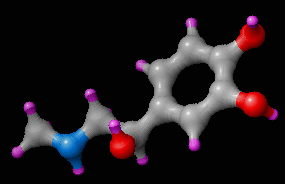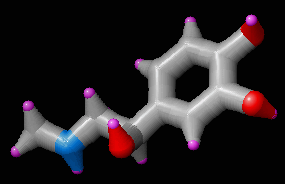PRO, PROBE
NAME
PRO, PROBE - set the bond probe radius.
SYNOPSIS
PRO value
PROBE value
DESCRIPTION
Set the bond probe radius. The bond probe is used to draw nice bonds
(cones and sticks, curved or straight). Small probe (about 0.8 angstroms)
is used to obtain curved bond shapes, while large probe (about 10 angstroms)
may be used to draw cones or sticks. Be sure to read the text about
the command
BONDS
to learn how to create nice images, playing with commands PROBE, ATOMS and
BONDS. Default probe radius is 0.8 angstroms, but this may be changed in
the configuration file
.garlicrc
.
One and only one bond probe radius is assigned to each loaded structure.
The bond probe radius may be changed separately for each structure.
The command PROBE affects only the structure which is currently "caught"
(see the command
CATCH
)
.
EXAMPLES
The images below show the same structure (adrenalin) drawn using two different
probes: 0.8 angstroms (curved bonds, the left image) and 10 angstroms
(conical sticks, the right image). In both cases all atoms were drawn using
the small atomic style with enhanced contrast (ATOMS SM2). Bonds were drawn
using the nice bond style (BONDS NICE).
|
probe 0.8
|
probe 10
|

|

|
NOTES
(1) Do not confuse the bond probe with the surface probe. The bond probe is
used to draw bonds, while the surface probe is used to generate surface points.
Read the text about the command SURFACE to learn more about the surface probe.
(2) To draw sticks, it is more convenient to use the commands BONDS STICKS
and STICKS. The keyword STICKS (short form STI) of the command BONDS
is used to draw bonds as sticks, while the separate command STICKS is used
to define the stick radius.
(3) To draw balls and sticks, it is convenient to use commands BALLS, STICKS,
BONDS STICKS and ATOMS BALLS.
RELATED COMMANDS
BONDS is used to define drawing style for bonds. SSB is used to define
drawing style for disulfide bonds. ATOMS is used to define drawing style
for atoms. STICKS is used to define the radius of sticks. BALLS is used to
define the radius of balls.



